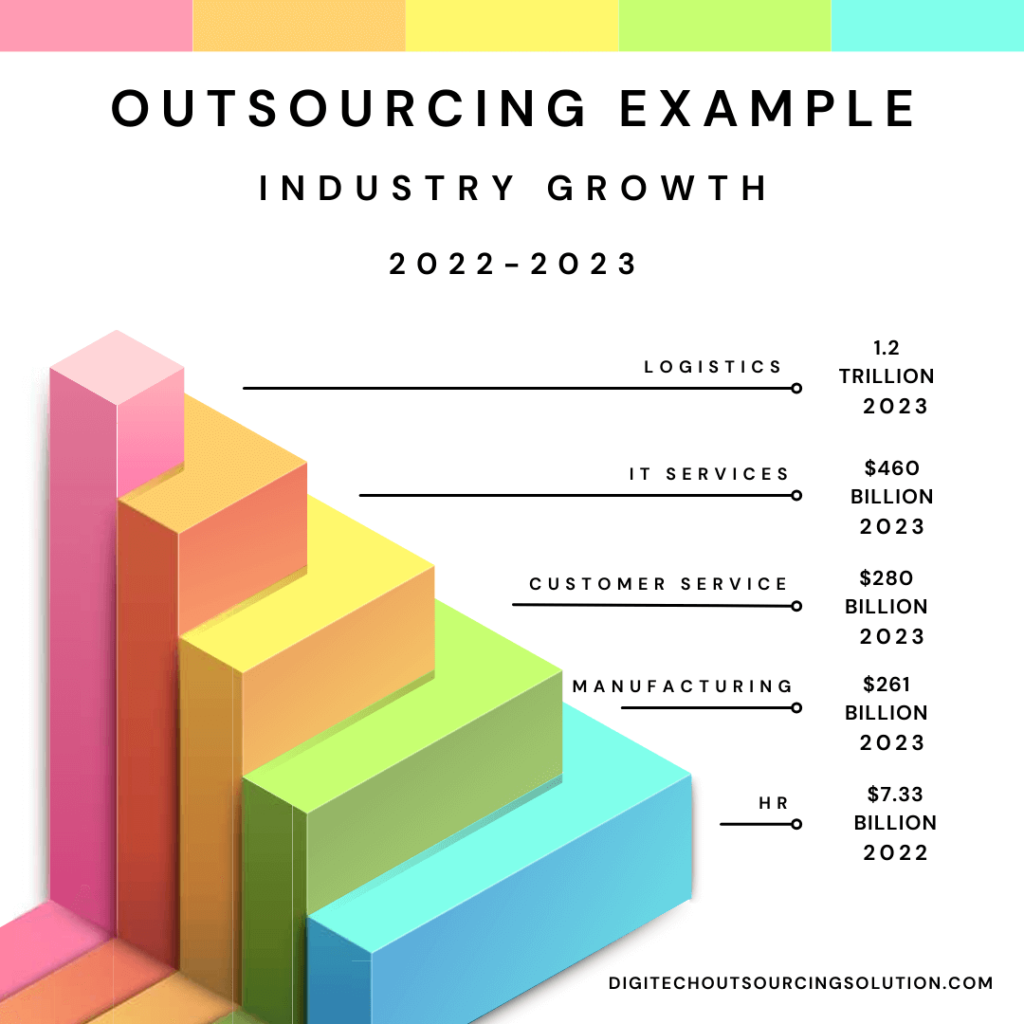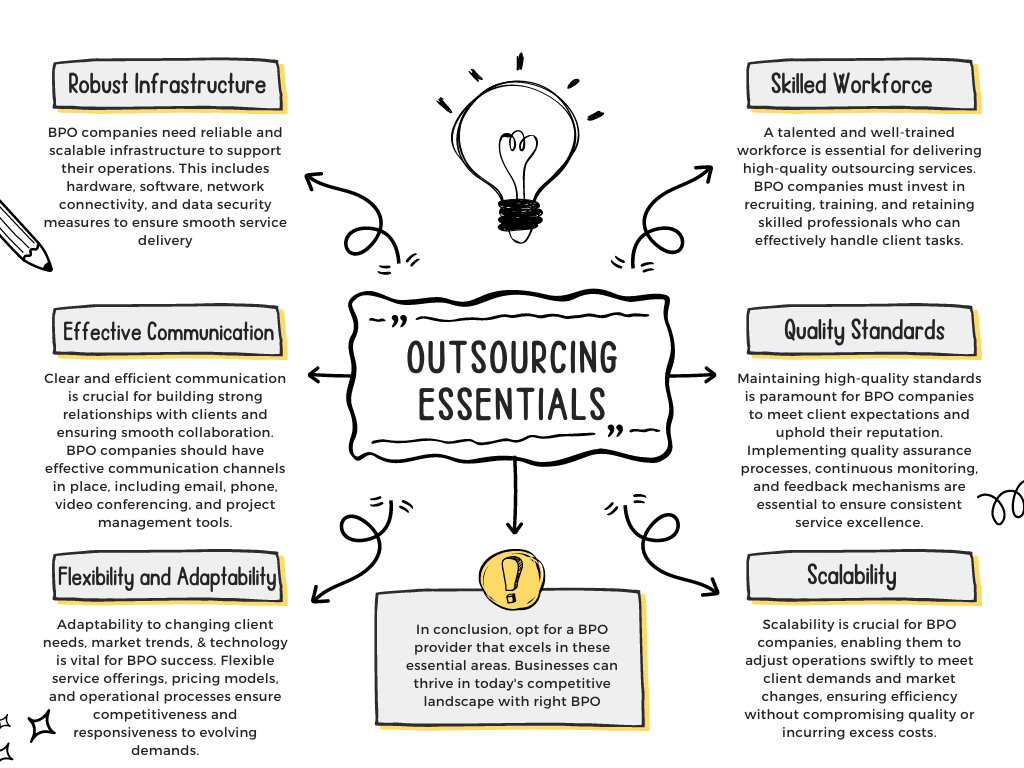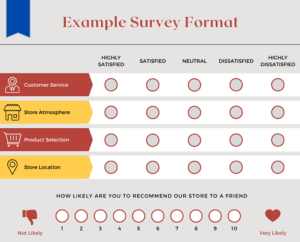In the contemporary landscape of global business, the term “outsourcing” has become ubiquitous, representing a strategic tool for companies to streamline operations, reduce costs, and enhance efficiency. As businesses navigate through the complexities of the modern market, outsourcing has emerged as a pivotal solution, exemplified by IBM, a best example of outsourcing, allowing organizations to focus on core competencies while delegating peripheral tasks to specialized service providers.
In this article, we delve into the multifaceted realm of outsourcing, exploring its various categories, exemplary companies, and the underlying reasons driving this strategic business practice.
Introduction to Outsourcing: A Paradigm Shift in Business Dynamics
Outsourcing began as early as 1981, as referred by Wikipedia article:
“The term outsourcing, which came from the phrase outside resourcing, originated no later than 1981 at a time when industrial jobs in the United States were being moved overseas, contributing to the economic and cultural collapse of small, industrial towns”
Outsourcing, in essence, refers to the practice of contracting out certain business functions or processes to third-party providers, either domestically or internationally. This transformative strategy has gained immense traction across industries, reshaping traditional business models and fostering a global network of interconnected services. According to a report by Deloitte, the global outsourcing market reached a value of $92.5 billion in 2020, underscoring its pivotal role in contemporary business operations
Offshoring of IT-enabled services, including both internal subsidiaries and external companies (offshore outsourcing), has experienced significant growth. This trend is closely associated with the expansion of telecommunication and Internet infrastructure in the late 1990s, providing reliable and cost-effective communication channels. This growth has facilitated the relocation of various services to low-cost countries, including:
Knowledge-based services encompassing engineering support, product design, research and development, and analytics.
- Back-office and administrative functions such as finance, accounting, HR, and legal.
- Customer-facing departments like call centers, marketing, and sales services.
- IT infrastructure management and application development.
Exploring Popular Categories of Outsourcing: Industries and Tasks
The spectrum of outsourcing is vast and encompasses a myriad of industries, each with its unique set of tasks that can be delegated to external entities. Let’s delve into some of the most prevalent categories of outsourcing:

IT Services:
IT services outsourcing involves companies utilizing external expertise for various tasks such as software development, infrastructure management, cybersecurity, and technical support.
In 2023, the total volume of IT outsourcing reached $460 billion USD. According to Precedence Research, the global IT and software outsourcing market is projected to reach approximately $1.06 trillion by 2030.
Among the most sought-after software outsourcing services are software development, application development, and general IT services.
Popular destinations for software outsourcing include Poland, the Czech Republic, Romania, India, Pakistan and China.
Customer Service:
Outsourcing customer service operations to call centers or virtual assistants not only improves customer satisfaction but also lowers operational costs. Industries that commonly outsource customer service include E-commerce, short-term rental management, healthcare, and SaaS businesses.
The market for BPO outsourcing was valued at USD 280.64 billion in 2023 and is expected to grow at a Compound Annual Growth Rate (CAGR) of 9.4% from 2023 to 2030. In 2022, the customer services segment held the largest market share, surpassing 30% of total revenue.
Accounting:
Outsourcing accounting functions such as bookkeeping and tax preparation offers specialized expertise and ensures regulatory compliance.
In 2022, the IT & telecommunication segment held the largest revenue share, making up approximately 34.0% of the overall market. The finance and accounting segment is expected to experience notable growth from 2023 to 2030.
Industries frequently outsourcing bookkeeping and accounting services include Real Estate, Short Term Rental Companies, Law Firms, Manufacturing & Construction, Retail and Wholesale, Healthcare, and Restaurants, Catering, and Cafes.
Legal Services:
Legal process outsourcing (LPO) encompasses tasks such as document review and contract drafting being delegated to offshore providers.
This trend has seen substantial growth as firms aim to reduce costs, tap into specialized expertise, and concentrate on core business functions while maintaining top-notch legal services for their clients.
As of 2022, the global legal process outsourcing market was valued at USD 13.67 billion. Forecasts predict a compound annual growth rate (CAGR) of 31.4% from 2023 to 2030, indicating significant expansion in the industry.
HR (Talent Acquisition):
Outsourced HR, particularly talent acquisition, involves delegating recruiting and talent acquisition tasks to streamline hiring processes and access a wider talent pool.
As of 2022, the global recruitment process outsourcing market was valued at USD 7.33 billion. Projections indicate significant growth, with the market expected to reach US$ 20.8 billion by 2027, representing a compound annual growth rate (CAGR) of 16.1% from 2023 to 2030.
Manufacturing:
Outsourcing manufacturing processes to regions with lower labor costs not only optimizes production efficiency but also allows businesses to concentrate on core competencies such as design, engineering, and marketing. This focus leads to enhanced efficiency and cost-effectiveness.
The Global Electronics Manufacturing Outsourcing Market is expected to grow at a notable compound annual growth rate (CAGR) of 8.5%. By 2027, it is projected to achieve a market value of USD 1.2 trillion.
Logistics:
Logistics outsourcing, also termed third-party logistics (3PL) outsourcing, involves companies engaging external service providers to oversee various facets of their supply chain operations. These services encompass transportation management, warehousing, inventory management, order fulfillment, and reverse logistics.
By delegating logistics functions to specialized providers, businesses can enjoy cost savings, heightened service levels, increased flexibility, and access to advanced technologies, all without the necessity for substantial investments in infrastructure and resources.
The Global 3PL Market is estimated to be valued at USD 1.29 trillion in 2024, with projections indicating growth to USD 1.68 trillion by 2029. This market is anticipated to expand at a compound annual growth rate (CAGR) of 5.48% during the forecast period (2024-2029).
Marketing:
Marketing outsourcing, particularly within the realm of Sales and Marketing Business Process Outsourcing (BPO), entails companies partnering with external entities to manage specific sales and marketing operations. This approach enables businesses to harness specialized expertise, enhance efficiency, and concentrate on core competencies, all while enhancing customer experiences and revenue generation.
The Global Sales And Marketing Business Process Outsourcing Market is anticipated to reach $49.2 billion by 2028, exhibiting a 9.5% compound annual growth rate (CAGR) throughout the forecast period. This expansion is propelled by the growing adoption of outsourcing for sales and marketing functions, aimed at improving business performance, extending market reach, and optimizing operational costs.
Cleaning Services
Outsourcing cleaning services involves companies enlisting external service providers to handle cleaning tasks and uphold cleanliness in various settings, including residential, commercial, institutional, and industrial spaces. This practice enables businesses to concentrate on their core activities while ensuring a clean and hygienic environment through specialized cleaning services offered by third-party vendors.
The cleaning services industry holds a substantial market share and demonstrates promising growth trends. The global cleaning services market was valued at USD 370.56 billion in 2022 and is projected to expand at a compound annual growth rate (CAGR) of 6.6% from 2023 to 2030, reaching USD 616 billion.
Business Development and Sales:
Outsourcing business development and sales involves companies enlisting external service providers to manage sales and business development activities on their behalf. This approach enables businesses to access specialized sales expertise, expand their market reach, increase revenue generation, and focus on core business functions, while leveraging the skills and resources of the outsourced team.
The market share for Outsourced Sales Services is substantial and exhibits promising growth trends. In the U.S., the Outsourced Sales Services Market was valued at USD 4,001.84 million in 2021 and is projected to reach USD 6,955.83 million by 2030, growing at a CAGR of 6.95%.
The U.S. Outsourced Sales Services Market encompasses various applications, including:
- Service Industry
- E-Commerce Industry
- Manufacturing Industry
- Banking Industry
- Others
Which is the best example of outsourcing: A Case Study Approach
The top five Business Process Outsourcing (BPO) companies are, as listed here:
- Accenture
- Cognizant
- IBM
- Wipro
- Genpact
These companies are widely recognized for their innovative solutions, global reach, and comprehensive services spanning multiple industries. They are prominent players in the BPO sector, known for their ability to deliver high-quality outsourcing services to clients worldwide.
IBM:
IBM has effectively leveraged offshore outsourcing for IT functions such as software development and technical support, resulting in cost reduction and heightened focus on innovation, which is a best example of outsourcing.
In a notable case study, IBM’s decision to outsource was primarily motivated by the imperative to trim operational expenses, tap into specialized expertise, and bolster scalability. This strategic move has fostered sustainable growth and conferred a competitive edge upon the company.
Kyndryl, a spin-off from IBM, specializes in managed infrastructure services. It excels in outsourcing the management of enterprises’ IT infrastructure, irrespective of its origin from IBM or another vendor. Kyndryl offers a diverse array of services encompassing application management, data management, AI integration, core enterprise and zCloud services, digital workplace solutions, network and edge management, as well as security and resiliency services. Additionally, Kyndryl provides customer advisory services that seamlessly integrate managed services, advisory solutions, and implementation assistance.
The company has recently introduced innovative services like Bridge, an operational monitoring system, and Vital, a design workshop tailored for prototyping applications. With a strategic focus on areas such as security, intelligent automation, and public cloud managed services, Kyndryl is poised to capitalize on the substantial $415 billion market opportunity it targets, aiming for robust revenue growth in the process.
Accenture:
Accenture is a leading global professional services company renowned for its comprehensive offerings in strategy, consulting, digital, technology, and operations. The company is esteemed for its adeptness in tackling intricate business challenges, fostering growth, and orchestrating operational transformations through cutting-edge solutions and technologies. Operating across diverse industries such as technology, healthcare, financial services, and communications, Accenture serves a vast clientele worldwide.
The best example of outsourcing is Accenture because as of March 2024, Accenture boasts a market capitalization of $212.19 billion, positioning it among the most valuable companies globally. Notably, the company has garnered acclaim for its prowess in technology services and has secured substantial market share in domains like Managed Security Services and Security Consulting Services.
Cognizant Technology Solutions:
Cognizant Technology Solutions Corporation stands at the forefront of professional services, offering a wide spectrum of digital services, consulting, application development, systems integration, testing, maintenance, infrastructure solutions, and business process services. The company strategically directs its investments towards digital realms, prioritizing areas like IoT, AI, experience-driven software engineering, and cloud services. Cognizant caters primarily to four key domains: Financial Services, Healthcare, Products & Resources, and Communications, Media & Technology.
With a market capitalization of approximately $35.79 billion as of March 2024, Cognizant competes with industry peers such as Accenture, Capgemini, IBM Global Services, Infosys Technologies, and Wipro. Competitive factors include performance and reliability, quality of technical support and services, responsiveness to customer needs, reputation and experience, financial stability, competitive pricing, and project management proficiency.
Conclusion: Embracing the Power of Outsourcing

Outsourcing emerges as a potent strategy for companies to optimize operations, foster innovation, and foster sustainable growth. By entrusting non-core functions to specialized providers, organizations can unlock efficiencies and concentrate on core competencies. Successful outsourcing, exemplified by companies such as IBM, Amazon, and Accenture, who serve as prime examples of outsourcing excellence, demands strategic planning, alignment, and a commitment to delivering value. Embracing outsourcing as a strategic imperative positions companies to excel in the dynamic realm of modern business.
While the outsourcing process may appear daunting or overhyped to many small and medium-sized businesses, as well as large corporations, identifying the right outsourcing company or Business Process Outsourcing (BPO) partner can simplify the journey and facilitate a successful and mutually beneficial onboarding process.




